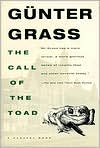The Call of the Toad. Translated by Ralph Mannheim
Macabre humor and deft narrative control spice  this doleful, satiric tale of love, mortality and politics in a changing Eastern Europe from the pen of the contemporary German master. When Alexander Reschke first meets Alexandra Piatkowska, she is on her way to a cemetery in Gdansk, Poland. The two discover they have much in common: she is a middle-aged Polish widow, he a German widower; she is an art restorer specializing in gilding, he a professor of art history specializing in tombstones; both were displaced from their birthplaces by the redrawing of borders after WW II; both champion the deceased’s right to be returned home for burial. As their romance quickly blooms, so do their shared ambitions; over a bottle of wine they found the Polish-German-Lithuanian Cemetery Association (PGLCA). Soon they have an international board of directors and acres of burial land in Gdansk, and the corpses of dead Germans (born there when it was Danzig, Germany), along with the survivors’ mighty Deutschemarks, are sent their way in daunting quantities. But the forces of capitalism overwhelm the pair’s good intentions, and they find themselves building resorts and golf courses on the would-be burial ground. Grass ( The Tin Drum ; Two States–One Nation? ) tells their story in the voice of Alexander’s former schoolmate, who has been commissioned to write a history of the PGLCA. This insightful, reluctant narrator cites photographs, recordings, videotapes, receipts and Alexander’s diaries–interjecting the occasional editorial remark–to portray a strange love affair and odd benevolence gone awry.
this doleful, satiric tale of love, mortality and politics in a changing Eastern Europe from the pen of the contemporary German master. When Alexander Reschke first meets Alexandra Piatkowska, she is on her way to a cemetery in Gdansk, Poland. The two discover they have much in common: she is a middle-aged Polish widow, he a German widower; she is an art restorer specializing in gilding, he a professor of art history specializing in tombstones; both were displaced from their birthplaces by the redrawing of borders after WW II; both champion the deceased’s right to be returned home for burial. As their romance quickly blooms, so do their shared ambitions; over a bottle of wine they found the Polish-German-Lithuanian Cemetery Association (PGLCA). Soon they have an international board of directors and acres of burial land in Gdansk, and the corpses of dead Germans (born there when it was Danzig, Germany), along with the survivors’ mighty Deutschemarks, are sent their way in daunting quantities. But the forces of capitalism overwhelm the pair’s good intentions, and they find themselves building resorts and golf courses on the would-be burial ground. Grass ( The Tin Drum ; Two States–One Nation? ) tells their story in the voice of Alexander’s former schoolmate, who has been commissioned to write a history of the PGLCA. This insightful, reluctant narrator cites photographs, recordings, videotapes, receipts and Alexander’s diaries–interjecting the occasional editorial remark–to portray a strange love affair and odd benevolence gone awry.
Copyright @ Reed Business Information, Inc.
